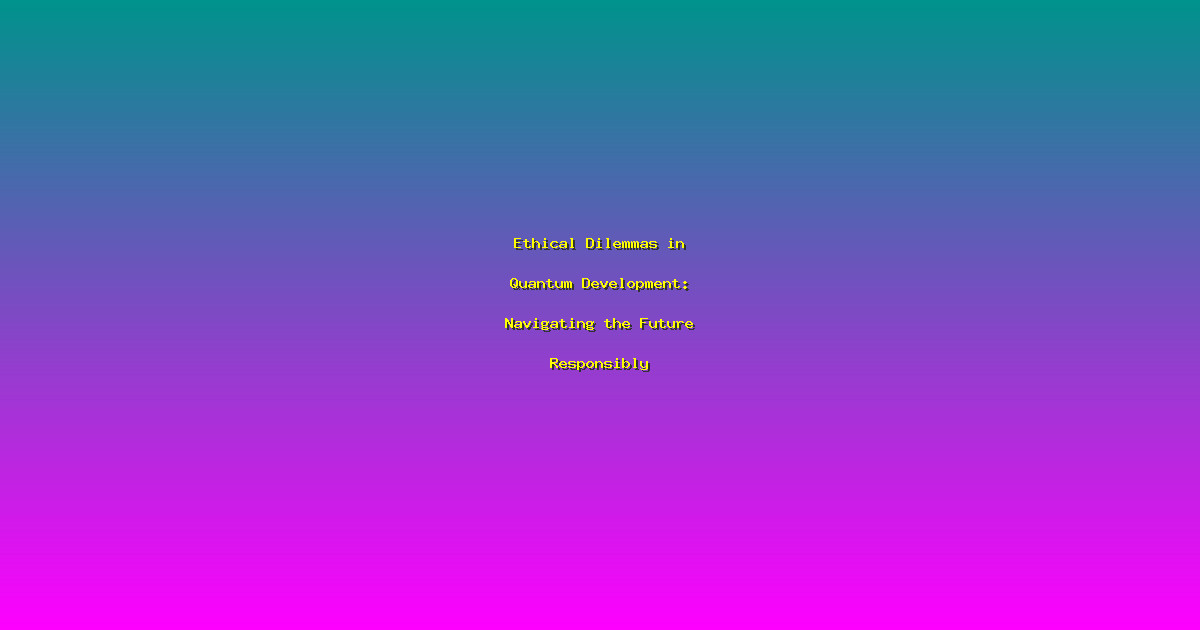Ethical Dilemmas in Quantum Development: Navigating the Future Responsibly
Quantum technology promises revolutionary advancements in computing power, cryptography, and simulation capabilities. However, as with all technology that pushes the boundaries of what is possible, quantum development presents a raft of ethical dilemmas that must be carefully considered. From privacy concerns to the potential for increased surveillance and the responsibility of developing technology that could change the landscape of global power dynamics, the ethical questions are profound. This article delves into the ethical dilemmas surrounding quantum development and explores how we can navigate these challenges to ensure a responsible and sustainable future.
The Ethical Landscape of Quantum Development
The ethical landscape of quantum development is complex and multifaceted. One of the primary concerns is privacy. Quantum computers, with their ability to break current encryption methods, pose a significant threat to data security. This opens up a Pandora's box of cybersecurity issues that could compromise sensitive information at an unprecedented scale. Additionally, the development of quantum technology by nations could lead to an arms race in quantum computing, exacerbating global tensions and potentially leading to the militarization of quantum technology.
Responsibility and Regulation
As quantum technology advances, it becomes imperative to establish a framework of responsibility and regulation. This includes guidelines for the ethical use of quantum computing, ensuring that the technology is not misused for nefarious purposes. Governments, industry leaders, and academic researchers must work together to create a set of ethical standards that apply to all facets of quantum development. Educating the public and policymakers about the implications of quantum technology is also crucial to ensuring that regulations are both effective and responsible.
FAQs
What are the main ethical concerns surrounding quantum computing?
The main ethical concerns include privacy breaches due to quantum computers' ability to break current encryption methods, the potential for increased surveillance, and the possibility of an arms race in quantum computing technology.
How can we ensure the responsible development of quantum technology?
Ensuring responsible development involves creating ethical guidelines, establishing regulatory frameworks, and fostering international collaboration to prevent the militarization and misuse of quantum technology.
What role do governments play in regulating quantum technology?
Government regulation is crucial to prevent misuse and to establish ethical standards for the development and use of quantum technology. This includes setting policies that ensure transparency and accountability.
Can quantum technology be used for good?
Yes, quantum technology has the potential to solve some of humanity's most pressing problems, such as developing new drugs faster, optimizing logistics for efficient resource distribution, and improving climate modeling.
How can we educate the public about quantum technology?
Education can be enhanced through public outreach programs, school curricula, and media campaigns that explain the basics of quantum technology and its implications for society.
Conclusion and Call to Action
As the world stands on the brink of a quantum revolution, it is crucial that we address the ethical dilemmas that come with it. By fostering international cooperation, establishing robust regulatory frameworks, and promoting public education and awareness, we can ensure that quantum technology is developed and utilized responsibly. It is up to all of us—scientists, policymakers, and the public—to work together to harness the power of quantum technology for the betterment of society.
Take action today by supporting organizations that promote ethical standards in quantum technology, staying informed about the latest developments, and advocating for responsible innovation.

